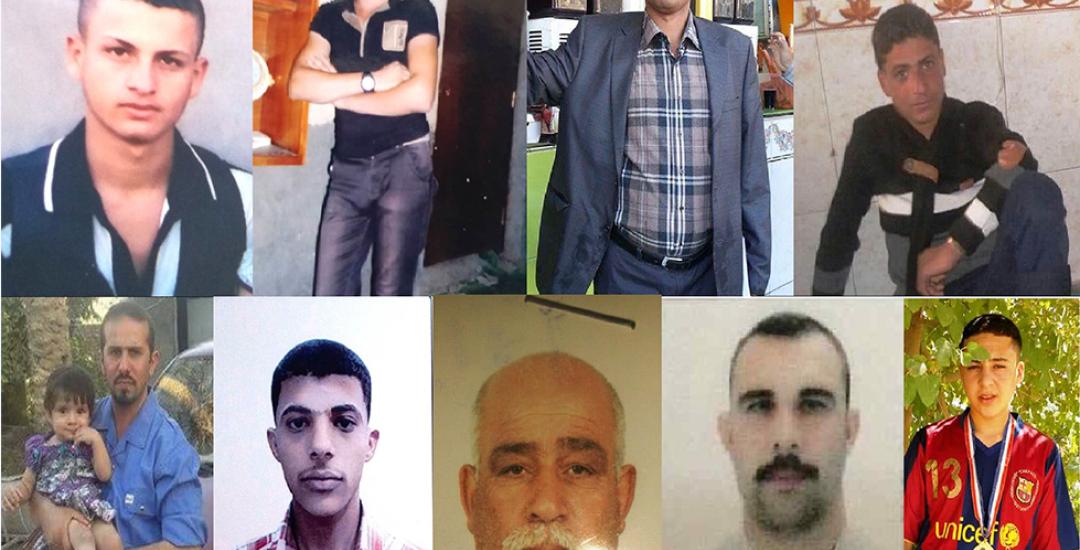
(Geneva, July 30, 2018) – Over the course of July 2018, Alkarama has submitted 11 cases of enforced disappearances in Iraq to the United Nations Committee on Enforced Disappearances (CED), of which seven have been documented in partnership with the NGO Al Wissam Humanitarian Assembly.
The majority of these individuals were internally displaced when they were abducted by various militias affiliated with the Popular Mobilisation Units (PMU), an umbrella organisation composed of approximatively 120 militias currently embedded in the Iraqi army.
These cases are indicative of the systematic practice of enforced disappearances across Iraq, disproportionally affecting internally displaced people (IDPs) suspected of alleged ties with the Islamic State (IS).
Enforced disappearances at checkpoints in the Karbala region
On June 15, 2015, Sami Al Jehaishi and his family were travelling by car from Mosul when they were stopped at the so-called “54 Checkpoint" run by the Hezbollah and Al Abbas Brigades. They were fleeing their hometown after it had been captured by the Islamic State. On that day, 80 other displaced persons transiting via this checkpoint were arrested by the militiamen. Al Jehaishi’s arrest was witnessed by two of his relatives travelling with him who were also arrested that day. The latter were released a month later from one of the secret detention centres run by the Hezbollah Brigades in the Al Anbar governorate.
The same day, Neshwan Al Sumaidaie, a 36-year-old high-level track and field champion, and his father were travelling from Karbala to Mosul when they were arrested at the “Al Wind” checkpoint run by the Hezbollah Brigades. The militiamen arrested Neshwan while letting his father go. On that day, the Hezbollah Brigades arrested approximatively 40 individuals travelling from Karbala to Mosul via this checkpoint.
On December 1, 2015, Jassim Al Salmani and his brothers Hussein, Saad and Jabal Al Salmani were travelling by car from Al Qaim to Baghdad. The four men were young students between the age of 16 and 22, fleeing their hometown that had been captured by IS. When they reached the Razzaza checkpoint manned by members of the Hezbollah Brigades, they were arrested by the militiamen, and transferred to one of brigades’ detention centres in Jurf Sakhar. Although Jabal Al Salmani was subsequently released, his brothers’ fates and whereabouts remain unknown. On that day, the Hezbollah Brigades conducted 60 arrests under similar circumstances.
This checkpoint was the scene of another abduction the following year. Moayad Al Jabouri, a 41-year-old engineer, was abducted by the Hezbollah Brigades on February 28, 2016 after fleeing Al Shirqat, his hometown, which is located in the Saladin Governorate. A month after the arrest, he was seen by a former detainee in a secret detention centre in Baghdad run by the Kata'ib al-Tayyar al-Risali militia. Since then, his relatives have received no information on his fate and whereabouts.
Enforced disappearances committed in Samarra in 2012 and 2014
On December 27, 2012, at 8 p.m., Saif Al Darraji attended the evening prayer with his cousin, Sohaib Al Darraji and one of his relatives, Yehya Al Darraji, at the Omar Al Farouq Mosque in Samarra. As they were exiting the building with other worshipers, the three men were arrested by members of the Samarra Operations Command, which operates under the authority of the Ministry of Defence.
They were forced into two military pick-up trucks before being taken to an unknown location. The victims’ family lodged a complaint with the Samarra criminal court and reported the disappearances to the office of Iraq’s former prime minister, Nouri Al Maliki, and to the Ministry of Interior, but to no avail.
Two years later, on October 2, 2014, members of the Saraya al Salam militia raided Walid Al Darraji’s house in Samarra before arresting him for investigation purposes. During the course of the arrest, the militiamen confiscated all his identification documents. The 33-year-old employee of the Ministry of Electricity and his family had been internally displaced since August 13, 2014 after the Islamic State’s assault on several districts of Samarra. It was in this context that they had fled the Jazirat district to find refuge in the Huiesh district of Samarra, situated on the western bank of the Tigris River.
On behalf of the victim’s family, the head of the Al Darraji tribe went to the Saraya al Salam to enquire about his fate and whereabouts. The militiamen threatened him and the family with reprisals if they came to renew their requests for information.
Enforced disappearance of a senior Iraqi officer’s chauffeur
Prior to his arrest, Haidar Al Halwani had been working as the chauffeur for Faisal Al Doori, senior officer in the traffic police department, whose case Alkarama had already submitted to the CED. On May 6, 2015, Al Halwani was driving Al Doori to Tikrit when, after crossing the Hueish military checkpoint located in the vicinity of Samarra, they were stopped at a mobile checkpoint controlled by the Hezbollah and the Harakat Hezbollah Al Nujaba Brigades. The two men were both arrested before being transferred to an unknown location. Shortly after the abduction, Al Halwani’s family reported the disappearance to the traffic police department and the Operations Command of Samarra, but to no avail.
Systematic practice of enforced disappearance in Iraq
As a party to the Convention on Enforced Disappearances (ICPPED) since 2010, Iraq has a legal obligation to halt the practice of enforced disappearances, which has reached epidemic proportions in recent years. The rate of missing people in the country remains one of the highest worldwide.
The Iraqi authorities should immediately clarify the fate and whereabouts of the disappeared and ensure with due diligence that the forces under their control abide by international human rights standards.
For more information or an interview, please contact media@alkarama.org (Dir: +41 22 734 1006).
